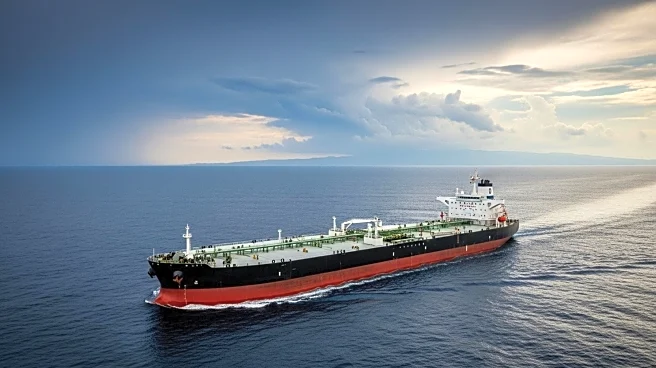What's Happening?
A recent report by Bloomberg and United Against a Nuclear Iran has revealed ongoing evasion of oil sanctions by Iran, with crude oil reaching China through alternative routes. Malaysia, previously a significant exporter of crude oil to China, has reduced its exports following exposure to criticism. Despite this reduction, Iranian-origin crude oil continues to reach China, now labeled as Malaysian through ship-to-ship transfers in international waters. This practice was highlighted by the explosion of the tanker Pablo in 2023. As Malaysian exports dropped by over 30% between July and August, Indonesia has seen a rise in its oil exports to China, although much of this is suspected to be Iranian oil mislabeled as Indonesian. The report suggests fraudulent bills of lading are being used to disguise the origin of the oil, with Indonesian ports like Kabil being falsely identified as the source.
Why It's Important?
The ongoing evasion of oil sanctions by Iran has significant implications for international trade and geopolitical relations. The ability of Iran to continue exporting oil to China despite sanctions undermines the effectiveness of these measures and highlights the challenges in enforcing international trade regulations. This situation affects global oil markets, potentially influencing oil prices and trade dynamics. Countries involved in these transactions, such as Malaysia and Indonesia, may face diplomatic and economic repercussions. The persistence of these practices also raises concerns about the integrity of international shipping and trade documentation, which could lead to increased scrutiny and regulatory measures.
What's Next?
As the fraudulent practices continue, authorities are likely to examine and close loopholes in shipping documentation. This could lead to further shifts in the routes and methods used to transport Iranian oil. Chinese ports that have received 'dark fleet' oil are beginning to ban future deliveries, which may result in oil being redirected to nearby ports. The ongoing evasion tactics suggest that unless cargoes are seized at sea, Iran will continue to export oil to China, potentially maintaining its export levels. The situation may prompt international bodies to enhance monitoring and enforcement measures to curb these practices.
Beyond the Headlines
The evasion of sanctions by Iran through complex shipping routes and fraudulent documentation highlights broader issues in international trade compliance and enforcement. It underscores the need for improved transparency and accountability in global shipping practices. The situation also reflects the geopolitical tensions surrounding Iran's oil exports and the challenges faced by countries attempting to enforce sanctions. This could lead to increased diplomatic efforts to address these issues and strengthen international cooperation in trade regulation.









